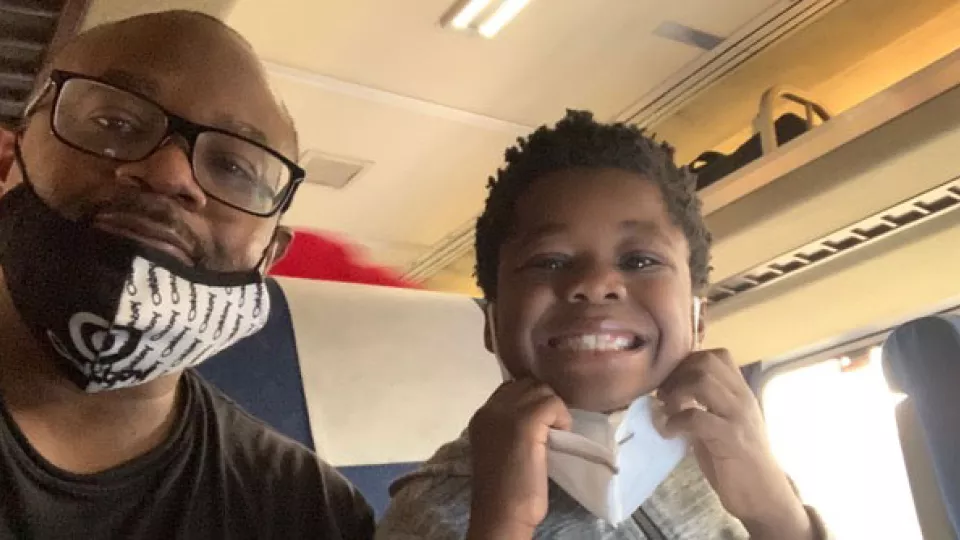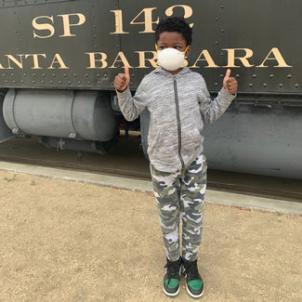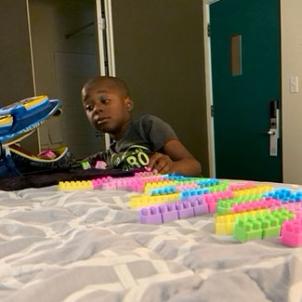
A Father’s Gratitude and Call to Donate Blood
Evan is a fun, active, curious and adventurous boy. Those are just a few of the ways to begin to describe him! He has a smile that makes other people want to smile, a laugh that is genuine and hearty. He was diagnosed with autism at age 3, and early intervention has been the key to his success in all areas of his life.
Schedule a Blood Donation Appointment
Click here, email us at blooddonorcenter@chla.usc.edu or call 323-361-2441 to make an appointment.
Since the COVID-19 pandemic hit, we don’t ride public transportation as frequently as we used to, and when we do, we are in gloves, masks, and I keep a handy bottle of hand sanitizer in my pocket. I know that if he were exposed to the virus, his compromised immune system caused by his sickle cell anemia would make fighting the virus more difficult for him. Like all kids, he loves to play, and his favorite thing to do is play with building blocks. What does he build mostly? His other favorite activity is riding the Metro transit trains and buses all over the city. When he gets home, he uses his blocks to build stations and trains, playing out the day’s trip.
We knew that Evan had a good chance of being born with the disease, since his mom and I both carry the trait for sickle cell. His diagnosis at birth was sickle cell anemia Type SS, which is the most common and severe version of the disease. Many kids who get this diagnosis have to get frequent blood transfusions because they lack the healthy red blood cells needed for normal organ functions. Evan is extremely fortunate to not need frequent transfusions, but he has been in a pain crisis situation where the treatment was necessary, and another case where he needed minor surgery at Children’s Hospital Los Angeles.

I’m in an online support group for parents of children with sickle cell, and I’ve met parents who go to Children’s Hospital monthly, some weekly, to get blood transfusion treatments for their kids. I asked one parent about their concerns about contracting COVID-19 with so many visits to the hospital. Of course, they had concerns, but what can you do when your child needs lifesaving medical treatment? All you can do is trust that the doctors and nurses and staff are taking all precautions to make sure that patients and blood donors are in a safe and sterile environment.
For me, every time I come to Children’s Hospital and see the banner above the parking lot entrance, showing CHLA always at the top of the ranks of the best children’s hospitals in the nation, I feel a big sense of relief, comfort and pride, knowing that I live in a city that provides the best children’s care anywhere.
Another thing I learned about patients who need frequent blood transfusions for pain crises is, in some cases, the parent or other family members are the primary blood donor for the patient. No matter who the donor is, the hospital tests everyone to make sure that they are the best possible match. Either way, it’s very important that blood from donors of the same ethnicity is in supply for the best transfusion results.

The sad thing is that the COVID-19 pandemic has caused a shortage in blood supply because donors of all races are afraid to donate. Children need blood transfusions for all kinds of treatments at the hospital. In the case of sickle cell, there is a greater potential for adverse reactions to occur from blood that isn’t a close match, even if it’s the same blood type—which is why the hospital only performs transfusions from donors who are close matches to the patient. I think it’s important to mention that blood donors are probably the most valuable asset in the treatment of sickle cell disease at Children’s Hospital, especially African American blood donors and other ethnicities. There is a prevalence of sickle cell anemia in the African American community, and that is where the greatest need lies.


